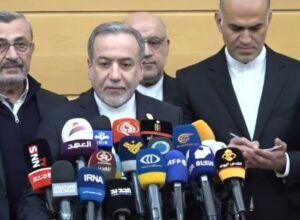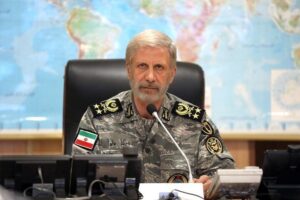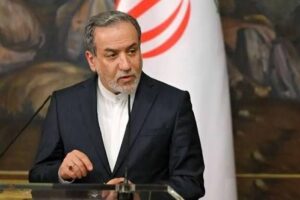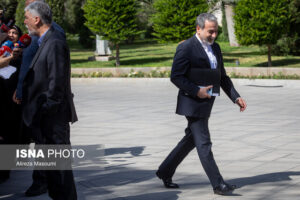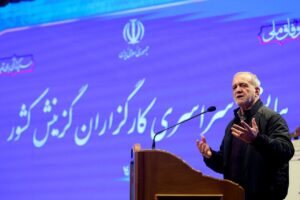Interview Text:
Majid Takht-Ravanchi, Iran’s Deputy Foreign Minister, stated in an interview that if the United States seeks to resume negotiations, it must explicitly rule out any further attacks on Iran.
U.S. Signals Intent to Return to Talks Through Intermediaries
According to BBC News, Takht-Ravanchi revealed in an interview that the administration of U.S. President Donald Trump has conveyed through intermediaries its desire to return to negotiations. However, it has not clearly addressed the “crucial issue” of refraining from further attacks during talks.
The Israeli regime’s aggressive military attack on Iran commenced at dawn on 13 June 2025, targeting nuclear facilities, military sites, and civilian locations, including hospitals, Evin Prison, and residential areas, resulting in the martyrdom of senior military commanders, nuclear scientists, and civilians.
On 23 June 2025, the United States directly intervened in the conflict, targeting three of Iran’s nuclear facilities in Fordow, Isfahan, and Natanz with bunker-buster bombs. While these facilities sustained significant damage, no increase in external radiation levels was reported.
Iran responded to these aggressive attacks through Operations “True Promise 3” and “Herald of Victory.”
The aggressive attacks on Iran were halted with a U.S.-proposed ceasefire on 24 June 2025.
These attacks, which Washington has acknowledged it fully supported and was informed of, occurred on the eve of the sixth round of indirect Tehran-Washington negotiations mediated by Oman.
Trump, who had deceptively proposed a two-week window to resume negotiations after the attacks, targeted Iran’s nuclear facilities just days after his statements.
Iranian officials have emphasized that negotiations are impossible as long as aggressive attacks persist.
Trump has claimed he will not allow Iran to enrich uranium, while Iran insists that uranium enrichment is its right and asserts that the United States is in no position to dictate terms for Iran’s peaceful nuclear program, which has been subject to the most stringent IAEA regulations to date.
Iran Will “Insist” on Uranium Enrichment for Peaceful Purposes
According to the BBC, Takht-Ravanchi stated that Iran will “insist” on uranium enrichment for peaceful purposes and rejected allegations that Iran is covertly advancing toward building a nuclear weapon.
Iran’s Deputy Foreign Minister said that the country has been “deprived of access to nuclear materials for its research program, which is essential for self-sufficiency.”
“Saying You Must Have Zero Enrichment and Bombarding You if You Disagree Is the Law of the Jungle”
Regarding conditions for limiting Iran’s uranium enrichment, he said: “The level and capacity can be discussed, but saying you must not enrich, that you must have zero enrichment, and if you don’t agree, we’ll bombard you—that’s the law of the jungle.”
The BBC noted that the extent of damage to Iran’s nuclear program from U.S. attacks remains unclear, and Takht-Ravanchi said he could not provide a precise assessment.
IAEA Director General Rafael Grossi stated that the attacks caused severe but “not complete” damage, while the U.S. President claimed that Iran’s nuclear facilities were “completely destroyed.”
Grossi also noted that Iran has the capacity to resume uranium enrichment within “a few months.” Takht-Ravanchi responded that he was unsure whether this would be the case.
Iran, viewing Grossi’s biased report on its nuclear program as a pretext for the recent aggressive attacks by Israel and the U.S., suspended cooperation with the IAEA last Wednesday through a parliamentary resolution.
Trump, continuing his bellicose rhetoric against Iran, stated that if intelligence indicates Iran can enrich uranium to concerning levels, he would “definitely” consider bombing Iran again.
Iran has condemned these statements, emphasizing its resolute commitment to defending its national interests and territorial integrity.
No Date Set for Potential Resumption of Negotiations
The BBC reported that Takht-Ravanchi stated no date has been agreed upon for a potential resumption of negotiations, and he was unsure what topics would be on the agenda if talks were to occur this week, as Trump claimed.
Iran’s Deputy Foreign Minister said: “Right now, we are seeking an answer to this question: Will we see repeated aggression during talks?”
U.S. Must Be Fully Transparent for Trust-Building
He added: “The U.S. must be completely transparent about this critical issue and what they propose to offer for the trust-building necessary for such talks.”
When asked whether Iran might consider revising its nuclear program, possibly in exchange for sanctions relief and foreign investment as part of an agreement, Takht-Ravanchi responded: “Why should we agree to such a proposal?”
He emphasized that Iran’s program, including uranium enrichment up to 60%, is “for peaceful purposes.”
Under the 2015 nuclear deal with world powers, Iran was not permitted to enrich uranium beyond 3.67%, the level required for commercial nuclear power plants, and was barred from enrichment at the Fordow facility for 15 years.
However, in 2018, during his first term, Trump withdrew from the agreement, claiming it was insufficient to prevent Iran from pursuing military objectives. He reinstated U.S. sanctions on Iran and continued imposing them until the end of his first term.
After enduring sanctions and European failure to fulfill commitments to normalize trade relations with Iran and mitigate U.S. sanctions for a year and a half, Iran announced it would gradually step back from its voluntary commitments under Article 36 of the nuclear deal. However, Iran stated it would reverse these steps if the other parties fully implemented their obligations.
Westerners Lacking Courage to Criticize the U.S. Should Remain Silent, Not Justify Aggression
The BBC reported that Takht-Ravanchi called the behavior of some European and Western leaders who endorsed the U.S. and Israeli attacks on Iran “laughable.”
He said those criticizing Iran’s nuclear program “should criticize the way we have been treated” and condemn the U.S. and Israel.
Iran’s Deputy Foreign Minister stated: “If they lack the courage to criticize the U.S., they should remain silent rather than try to justify aggression.”
Takht-Ravanchi also noted that Iran has received messages through intermediaries that the U.S. “has no intention of targeting Ayatollah Seyyed Ali Khamenei, Iran’s Supreme Leader, to pursue regime change in Iran.”
He emphasized that this would not happen and described the idea as “equivalent to a futile act.”
**Iranians Will Unite Against Foreign Aggression**
He said that while some Iranians “may criticize certain government actions, they will unite to counter foreign aggression.”
Iran Will Adhere to the Ceasefire as Long as “No Military Attacks Are Launched Against Us”
Iran’s Deputy Foreign Minister stated that it is “not entirely clear” whether the ceasefire with the Israeli regime will hold, but Iran will adhere to it as long as “no military attacks are launched against us.”
He added that Iran’s Arab allies in the Persian Gulf “are working to create the necessary space for dialogue.” Qatar has so far played a key role in this regard.
We Want Dialogue and Diplomacy
Takht-Ravanchi stated: “We do not want war. We want to engage in dialogue and diplomacy, but we must be prepared and cautious to avoid being caught off guard again.”

